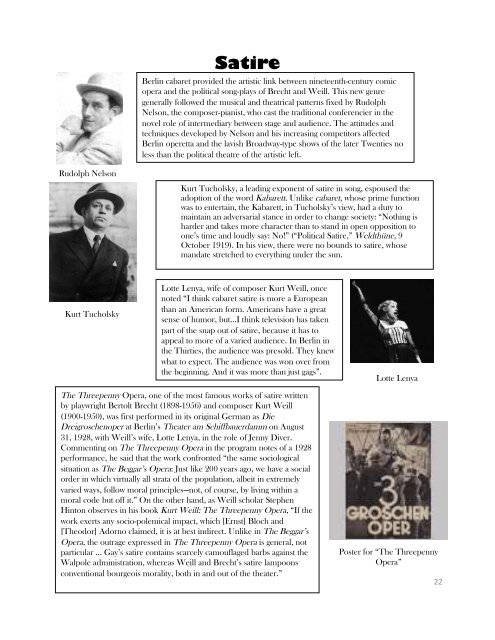Create successful ePaper yourself
Turn your PDF publications into a flip-book with our unique Google optimized e-Paper software.
Rudolph Nelson<br />
Kurt Tucholsky<br />
Satire<br />
Berlin cabaret provided the artistic link between nineteenth-century comic<br />
opera and the political song-plays of Brecht and Weill. This new genre<br />
generally followed the musical and theatrical patterns fixed by Rudolph<br />
Nelson, the composer-pianist, who cast the traditional conferencier in the<br />
novel role of intermediary between stage and audience. The attitudes and<br />
techniques developed by Nelson and his increasing competitors affected<br />
Berlin operetta and the lavish Broadway-type shows of the later Twenties no<br />
less than the political theatre of the artistic left.<br />
Kurt Tucholsky, a leading exponent of satire in song, espoused the<br />
adoption of the word Kabarett. Unlike cabaret, whose prime function<br />
was to entertain, the Kabarett, in Tucholsky’s view, had a duty to<br />
maintain an adversarial stance in order to change society: “Nothing is<br />
harder and takes more character than to stand in open opposition to<br />
one’s time and loudly say: No!” (“Political Satire,” Weldthüne, 9<br />
October 1919). In his view, there were no bounds to satire, whose<br />
mandate stretched to everything under the sun.<br />
Lotte Lenya, wife of composer Kurt Weill, once<br />
noted “I think cabaret satire is more a European<br />
than an American form. Americans have a great<br />
sense of humor, but…I think television has taken<br />
part of the snap out of satire, because it has to<br />
appeal to more of a varied audience. In Berlin in<br />
the Thirties, the audience was presold. They knew<br />
what to expect. The audience was won over from<br />
the beginning. And it was more than just gags”.<br />
The Threepenny Opera, one of the most famous works of satire written<br />
by playwright Bertolt Brecht (1898-1956) and composer Kurt Weill<br />
(1900-1950), was first performed in its original German as Die<br />
Dreigroschenoper at Berlin’s Theater am Schiffbauerdamm on August<br />
31, 1928, with Weill’s wife, Lotte Lenya, in the role of Jenny Diver.<br />
Commenting on The Threepenny Opera in the program notes of a 1928<br />
performance, he said that the work confronted “the same sociological<br />
situation as The Beggar’s Opera: Just like 200 years ago, we have a social<br />
order in which virtually all strata of the population, albeit in extremely<br />
varied ways, follow moral principles—not, of course, by living within a<br />
moral code but off it.” On the other hand, as Weill scholar Stephen<br />
Hinton observes in his book Kurt Weill: The Threepenny Opera, “If the<br />
work exerts any socio-polemical impact, which [Ernst] Bloch and<br />
[Theodor] Adorno claimed, it is at best indirect. Unlike in The Beggar’s<br />
Opera, the outrage expressed in The Threepenny Opera is general, not<br />
particular … Gay’s satire contains scarcely camouflaged barbs against the<br />
Walpole administration, whereas Weill and Brecht’s satire lampoons<br />
conventional bourgeois morality, both in and out of the theater.”<br />
Lotte Lenya<br />
Poster for “The Threepenny<br />
Opera”<br />
22



